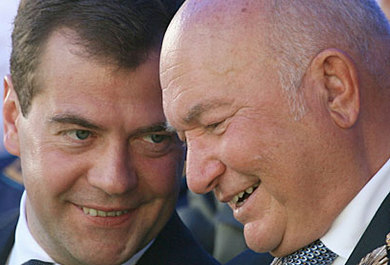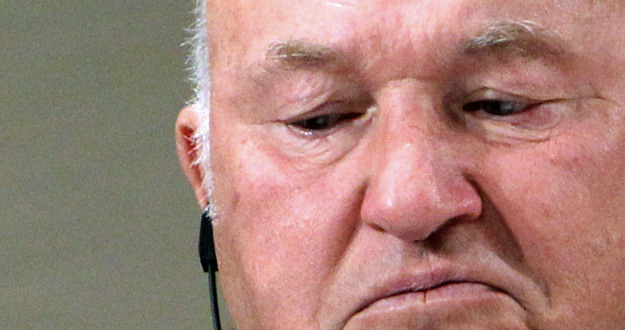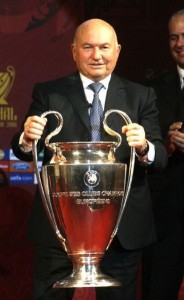What the downfall of Moscow’s colorful mayor really says about the Kremlin

Thedeathwatch for this city’s immortal mayor, Yuri Luzhkov, had been on for weeks. Since early September, Luzhkov has been the focus of a vicious Kremlin smear campaign intended to irritate him into resigning quietly, something the Kremlin is usually able to accomplish with ease. This time, however, it met with unexpected resistance. Last week, Luzhkov went on vacation to Austria, a trip insiders said had been the product of an ultimatum: Take a week to think over the terms, Luzhkov was told; resign when you come back. All of Moscow waited for his resignation, which Kremlin sources told the papers would come on Monday. But when Luzhkov returned Sunday night, he was defiant. This was all “delirium,” he told the Interfax news agency on Monday morning. “I do not plan to resign of my own volition,” he said, and went on with his work.
On Tuesday, however, Moscow awoke to find that the man who was appointed to rule it in 1992, who had been able to hold on to the seat ever since through chaotic political change and economic cataclysms, had not survived the night. He had been brutally, cruelly fired all the way from China, where President Dmitry Medvedev was traveling on official presidential business. Shortly before 8 a.m., Medvedev’s order to remove Luzhkov from his post hit the wires. The reason? Luzhkov had “exhausted the trust of the president of the Russian Federation.” Then Medvedev got up on a podium and calmly delivered a speech to his audience in Shanghai on, of all things, the importance of cities. Back in Moscow, a joke went viral: Everything is made in China nowadays, even Luzhkov’s termination.
Luzhkov, too, woke up to the news, which he learned through the press just like everyone else. He had just arrived at his office and all his colleagues had lined up with gifts and flowers to belatedly congratulate the mayor on his 74th birthday. Most of them did not yet know that the mayor was no longer the mayor. When they found out, many were stunned. “I haven’t seen such faces in a long time,” tweeted one Kremlin-affiliated blogger who stopped by the mayor’s office that morning. “It feels as if the world has ended.” “It shocked him, of course,” one of the mayor’s subordinates told me, adding that the choice of tactics was because “they wanted to hurt him more, to humiliate him.” As if to rub salt into the wound, the president elaborated through a spokesman that he would not be meeting with Luzhkov.
Humiliation was precisely the point of this entire drama. As the initial shock of Luzhkov’s firing wears off, the attention of Moscow’s commentariat (as well as the opposition) has turned back to its favorite question: What does this mean for the Medvedev-Putin duumvirate? Most voices have been praising Medvedev for proving his independence from Prime Minister Vladimir Putin, the man thought to be the real decider in this town. The theory goes that Medvedev wanted Luzhkov out but Putin wanted him to stay, causing a split behind the scenes. The fact that Luzhkov was fired, according to this school of thought, indicated that Medvedev won and Putin lost. “[Medvedev] showed his political independence,” says political analyst Alexei Makarkin. “Medvedev wants to be president, so he makes a decision that is associated with a president. This is an election campaign, a clear declaration that he wants to be president after 2012.”
But that explanation makes little sense, as does any that treats the presidency as a real contest between Medvedev and Putin, or a perceived split between the two as something other than political theater. As any government operative here will tell you without blushing, those assumptions are both patently false. “It’s clear how the system works,” one high-ranking state banker told me. “Putin is the number one boss, and Medvedev is the place holder. There is no doubt about their roles.”
Moreover, the popular theory that Medvedev wanted Luzhkov out and Putin didn’t is merely wishful thinking. Yes, Medvedev publicly snubbed Luzhkov on his birthday last week, declining to congratulate the mayor (though his wife did), while Putin sent the mayor a birthday telegram calling him “an experienced and competent professional.” But Putin is not known for his sincerity, something his spokesman has confirmed, informing the press that Luzhkov was merely receiving a template telegram sent to all high-level bosses on their birthdays. Its leak was most likely Luzhkov’s doing: the sort of divisive stunt — attempting to show air between the terrible twosome — that lined the mayor up for public execution in the first place. “In our Russian bureaucracy, trying to split the tandem is the deadly sin,” says Aleksey Chadaev, the young new head of United Russia’s political strategy.
Instead, Putin determined that Luzhkov needed to go and sent in Medvedev to do the dirty work, a move that not only knocks out a powerful rival but leaves his hands unsoiled in what has become a bloody fight. “Putin wanted to stay in the shadows on this one, and he won by doing so,” a highly placed United Russia official told me. “Luzhkov was made into a cautionary tale; he was rather publicly and shamefully trampled. The elites surely won’t love Medvedev for this, and it will be hard for him to win back their love.”
The firing also acts as a shot across the bow to Moscow’s elite. Luzhkov’s downfall has been greeted with nearly unanimous hoots of joy in Moscow and the blogosphere across the entire strange range of the Russian political spectrum. Its target, however, was actually the elites and the vast Sopranos-like groupings that have long fed out of Luzhkov’s overflowing coffers. Those elites, who have relaxed a bit under the thaw-with-a-Medvedev-face, had to be shown that you don’t talk back to the Kremlin and that the Kremlin is never, ever wrong.

And Luzhkov had to be made an example of. He had long had his own wealthy political base — turf that he physically shared with the Kremlin. As long as he toed the state’s line, he was allowed to keep a sizable portion of the loot. But as soon as he publicly contradicted the Kremlin, it had to respond with force. Matters got worse after the decision was made for him to leave. Luzhkov, with a measure of foolhardy, suicidal confidence, pushed back in a battle he never could have won. His newspaper, Moskovsky Komsomolets, published editorials defending him; he made a counterattack to the TV “exposés” about him (which never aired for “technical reasons”). He repeatedly, publicly denied that he was resigning.
Luzhkov’s Monday refusal was the final straw. As Natalia Timakova, Medvedev’s spokeswoman, explained to reporters on Tuesday, Luzhkov “took a weeklong vacation — which was signed off on by the president’s administration — in order to think over how he would act next.” There are two ways for a regional boss to leave his post before his term is up, Timakova explained: either by his own will, or the harsher will of the president. “You can draw your own conclusions,” she added.
And indeed, Luzhkov came back and publicly flaunted the understanding he had reached with the Kremlin. “Everyone was just waiting for when he would resign,” the United Russia official said. “Everyone, including people in Medvedev’s circle, hoped that they would be able to reach some agreement, that Luzhkov would not stand on principle. But he did.” Apparently, Luzhkov was simply bargaining for more time — “He wanted to go in November so he wouldn’t be seen as leaving because of the media scandal,” another United Russia member told me. “But they demanded he leave now.”
No matter how harmless or trivial Luzhkov’s counterdemand, he misread the Kremlin’s mood, and the response was instantaneous: Medvedev fired him from China, without even waiting one more day to do it from Moscow. The lesson was clear: You will not publicly humiliate the Kremlin. (That’s something it does well enough on its own.)
The message registered very, very quickly. Luzhkov was roundly criticized in the press, and every prominent political figure gloated and cheered. The populist Vladimir Zhirinovsky, a longtime Luzhkov foe, declared, “This is my happiest day in 20 years!” A journalist in Moscow had a hard time finding anyone to say anything positive about the ex-mayor, though just a month ago people were afraid to say anything negative about Luzhkov or his wife for fear of an unwinnable libel suit. “It’s like the purges,” the journalist told me. “No one wants his stain on them.” Even the usually cautious politician Anatoly Chubais struggled with the stampede to renounce all ties with Luzhkov, with whom he worked to implement political reforms after the fall of the Soviet Union. “I have one human rule,” he told reporters. “About people who are leaving, [you can say] either good things or nothing at all. And I’ve stuck to that in politics, which is why I simply have nothing to say.”
Only Luzhkov had something to say, which he said in a three-page rant he asked the head of the president’s administration to deliver to Medvedev on Monday night. After he was fired, he decided that now was certainly not the time to go quietly into the rainy night, and leaked it to the opposition press. The letter confirmed everyone’s suspicions — an offer had been made that could not be refused. Luzhkov also — again suicidally, as there is now talk of criminal charges — berated Medvedev for not delivering on promises for democracy. He compared Medvedev’s quote vis-à-vis the mayor’s firing, “Whoever is not in agreement can join the opposition,” to Stalin’s signature phrase, “Whoever is not with us is against us.” “The more important thing,” Luzhkov wrote, “is that, in our country, there is a fear to express one’s opinion since ’37,” referring to Stalin’s Terror. Luzhkov then compared himself to two hallowed Soviet dissidents, the late cellist Mstislav Rostropovich and his wife Galina Vishnevskaya. This from a man expert at crushing protests and muzzling the press.
All this showed that fears about the Luzhkov crook machine turning on the Kremlin out of loyalty to the mayor were unfounded: There is no loyalty in Russian politics, only self-preservation. In fact, Vladimir Resin, one of Luzhkov’s deputies and, according to businessmen who have worked with him, one of the most corrupt men in the mayor’s constellation, was named Luzhkov’s successor. He did not protest. (Tellingly, the only person to protest Luzhkov’s dismissal was Iosif Kobzon, Russia’s Frank Sinatra, with all the purported mob links but none of the talent. After he was seen leaving the mayor’s office with a sad Luzhkov in the rain, Kobzon vented his sense of injustice: “You cannot commandeer the fate of a great government figure, of which [Luzhkov] is one, just like that!” he said in a rather tone-deaf statement.)
Toward evening, as Luzhkov’s aides cleared his stuff out of his office, Putin finally emerged from his silence. His work done for him, he expressed approval of Medvedev’s quick action. “Yuri Mikhailovich [Luzhkov] did a lot for Moscow’s development,” he told journalists who followed him to the northern republic of Komi. “But it is perfectly obvious that the relationship of the Moscow mayor and the president didn’t work out, but the mayor remains the subordinate of the president, and not the other way around. That’s why steps should have been taken in a timely manner to normalize the situation.” As for that law that allows the president to fire the Lord of Moscow with the stroke of a pen? “Your humble servant was the author of that law,” he said, humbly.

